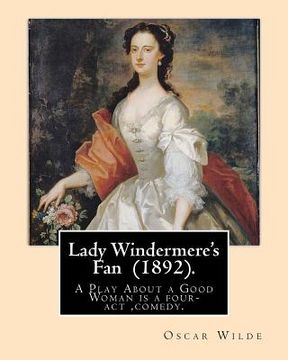Lady Windermere's Fan (1892). By: Oscar Wilde: A Play About a Good Woman is a four-act comedy by Oscar Wilde. (en Inglés)
Reseña del libro "Lady Windermere's Fan (1892). By: Oscar Wilde: A Play About a Good Woman is a four-act comedy by Oscar Wilde. (en Inglés)"
Lady Windermere's Fan, A Play About a Good Woman is a four-act comedy by Oscar Wilde, first produced 22 February 1892 at the St James's Theatre in London. The play was first published in 1893. Beautiful, aristocratic, an adored wife and young mother, Lady Windermere is 'a fascinating puritan' whose severe moral code leads her to the brink of social suicide. The only one who can save her is the mysterious Mrs Erlynne whose scandalous relationship with Lord Windermere has prompted her fatal impulse. And Mrs Erlynne has a secret - a secret Lady Windermere must never know if she is to retain her peace of mind. ....... Oscar Fingal O'Flahertie Wills Wilde (16 October 1854 - 30 November 1900) was an Irish playwright, novelist, essayist, and poet. After writing in different forms throughout the 1880s, he became one of London's most popular playwrights in the early 1890s. He is remembered for his epigrams, his novel The Picture of Dorian Gray, his plays, as well as the circumstances of his imprisonment and early death. Wilde's parents were successful Anglo-Irish Dublin intellectuals. Their son became fluent in French and German early in life. At university, Wilde read Greats; he proved himself to be an outstanding classicist, first at Dublin, then at Oxford. He became known for his involvement in the rising philosophy of aestheticism, led by two of his tutors, Walter Pater and John Ruskin. After university, Wilde moved to London into fashionable cultural and social circles. As a spokesman for aestheticism, he tried his hand at various literary activities: he published a book of poems, lectured in the United States and Canada on the new "English Renaissance in Art", and then returned to London where he worked prolifically as a journalist. Known for his biting wit, flamboyant dress and glittering conversation, Wilde became one of the best-known personalities of his day. At the turn of the 1890s, he refined his ideas about the supremacy of art in a series of dialogues and essays, and incorporated themes of decadence, duplicity, and beauty into his only novel, The Picture of Dorian Gray (1890). The opportunity to construct aesthetic details precisely, and combine them with larger social themes, drew Wilde to write drama. He wrote Salome (1891) in French in Paris but it was refused a licence for England due to the absolute prohibition of Biblical subjects on the English stage. Unperturbed, Wilde produced four society comedies in the early 1890s, which made him one of the most successful playwrights of late Victorian London. At the height of his fame and success, while his masterpiece, The Importance of Being Earnest (1895), was still on stage in London, Wilde had the Marquess of Queensberry prosecuted for criminal libel. The Marquess was the father of Wilde's lover, Lord Alfred Douglas. The charge carried a penalty of up to two years in prison. The trial unearthed evidence that caused Wilde to drop his charges and led to his own arrest and trial for gross indecency with men. After two more trials he was convicted and imprisoned for two years' hard labour. In 1897, in prison, he wrote De Profundis, which was published in 1905, a long letter which discusses his spiritual journey through his trials, forming a dark counterpoint to his earlier philosophy of pleasure. Upon his release he left immediately for France, never to return to Ireland or Britain. There he wrote his last work, The Ballad of Reading Gaol (1898), a long poem commemorating the harsh rhythms of prison life. He died destitute in Paris at the age of 46.
Oscar Wilde es considerado uno de los dramaturgos más destacados del Londres victoriano tardío. Además, fue una celebridad de la época debido a su gran y aguzado ingenio. Hoy en día, es recordado por sus epigramas, sus cuentos, sus obras de teatro, su única novela, El retrato de Dorian Gray, y la tragedia de su encarcelamiento, seguida de su muerte prematura.
Ver más
Ver menos

